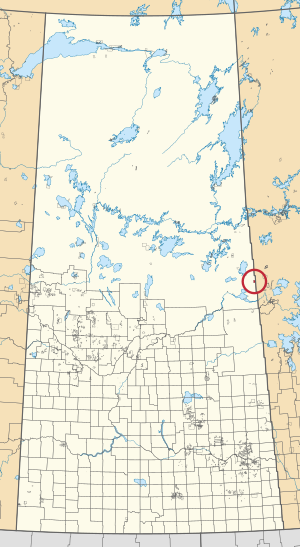Sturgeon Weir 184F facts for kids
Quick facts for kids
Sturgeon Weir 184F
|
|
|---|---|
| Sturgeon Weir Indian Reserve No. 184F | |

Location in Saskatchewan
|
|
| First Nation | Peter Ballantyne |
| Country | Canada |
| Province | Saskatchewan |
| Area | |
| • Total | 2,329.4 ha (5,756.1 acre) |
| Population
(2016)
|
|
| • Total | 81 |
| Community Well-Being Index | 51 |
Sturgeon Weir 184F is a special area of land in Saskatchewan, Canada. It is known as an Indian reserve, which is land set aside for the use and benefit of a First Nations group. This particular reserve belongs to the Peter Ballantyne Cree Nation.
Sturgeon Weir 184F is located about 55 kilometres southeast of a town called Flin Flon. In 2016, a count showed that 81 people lived there. They lived in 20 homes out of 26 available houses.
Contents
Understanding Sturgeon Weir 184F
What is an Indian Reserve?
An Indian reserve is a piece of land in Canada that is legally owned by the King of Canada. However, it is set aside for the use and benefit of a specific First Nation. These lands are managed by the First Nations themselves, often with support from the Canadian government. They are important places for First Nations people to live, practice their culture, and keep their traditions alive.
Who are the Peter Ballantyne Cree Nation?
The Peter Ballantyne Cree Nation is a large First Nations group in Saskatchewan. They are part of the Cree people, one of the biggest Indigenous groups in North America. Their traditional lands cover a wide area, and they have several reserves, including Sturgeon Weir 184F. The Nation works to support its members and protect their rights and culture.
Community Well-Being Index
The Community Well-Being Index is a way to measure how well a community is doing. It looks at things like education, jobs, income, and housing. The index uses a score out of 100. A higher score means the community is doing better.
In 2016, Sturgeon Weir 184F had a Community Well-Being Index score of 51. This score was compared to other communities:
- The average score for all First Nations communities was 58.4.
- The average score for communities that are not First Nations was 77.5.
This index helps people understand what areas a community might need more support in to improve the lives of its residents.
 | Isaac Myers |
 | D. Hamilton Jackson |
 | A. Philip Randolph |

